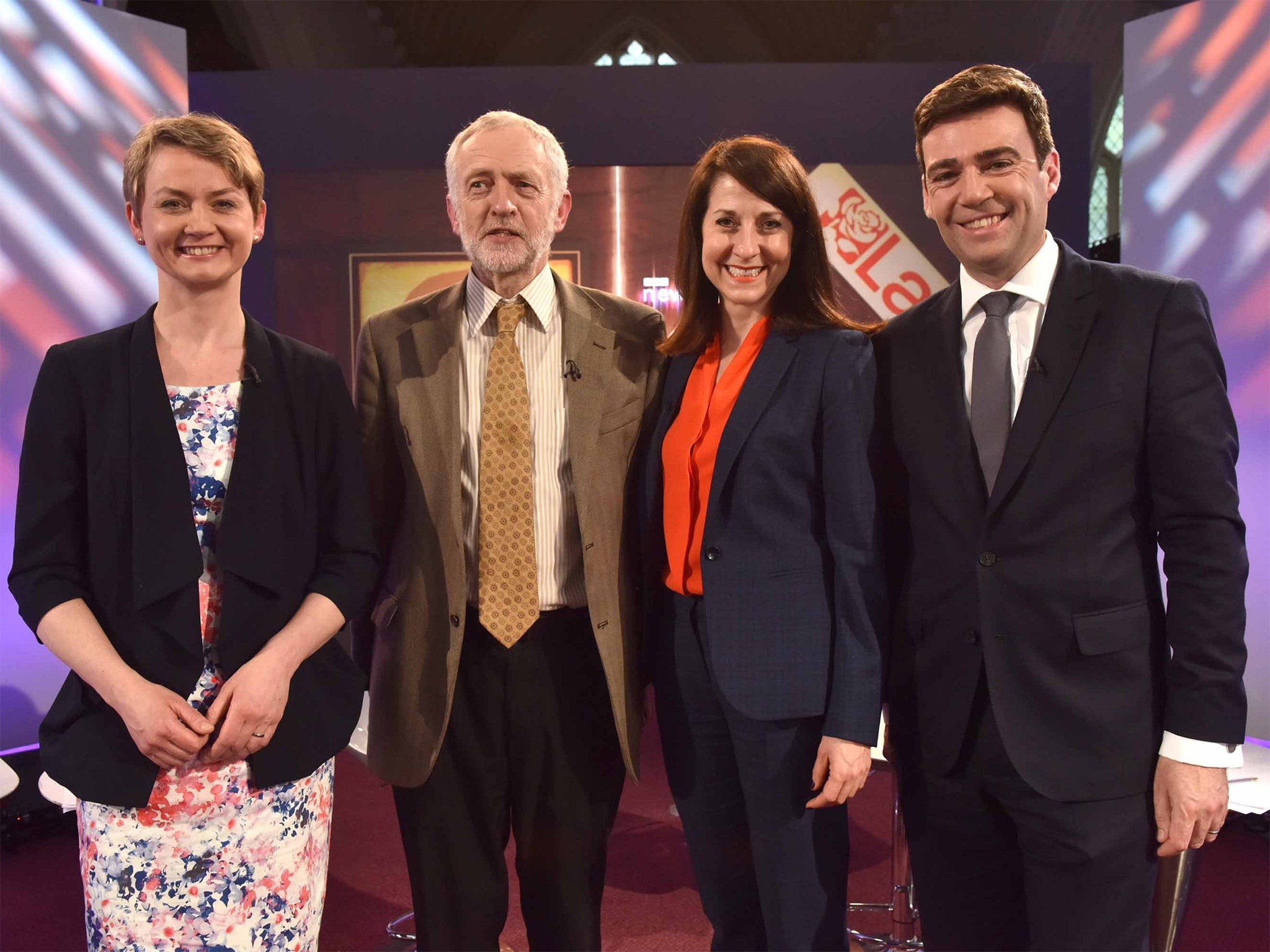The eight questions that Labour leadership candidates need to answer
If they want to be prime minister, the four contenders have to show they understand the people’s doubts about them and their party


The relatively small part of the public who have not, for the time being at least, given up on Labour are watching recent developments in the leadership contest and asking themselves “does Labour not get it at all?”
They would be entirely forgiven for thinking that not only do we not “get it” but that we have, effectively, seen the message the public sent us on 7 May and put two fingers up.
I like Jeremy Corbyn, he’s an honourable man and a good MP. I also think leadership contests are best when they are actual contests (unlike Gordon Brown’s selection). What is tragic here, however, is that the British people made abundantly clear at the general election what they thought of the party, our policies and the basic position we had adopted. Our response, culminating in Jeremy Corbyn’s nomination as a contender, has been to receive that message and proceed to do the exact opposite of what is required.
As a comparison, if the Tories had fought and decisively lost an election on the right, and then gone on to conduct a leadership contest in which an MP like Peter Bone was nominated as one of four contenders, the public would, rightly, think that they weren’t listening to them or ready to be taken seriously.
Add to this the fact that the front runner Andy Burnham, has declared that the 2015 manifesto was the best he stood on since 1997 and we are clearly not in a good place.
Between now and September the leadership contenders have a chance to prove Labour has learnt from its mistakes and can be relevant in people’s lives again.
To do so they must answer some pressing questions and in order to win an election again must, in my view, provide the type of answers I set out below.
1. Did Labour spend too much money in government?
The central problem Labour faced at the election, aside from Ed Miliband’s unelectability, was that the public did not trust us on the economy. Polling conducted by the TUC of those voted on 7 May found that the Conservatives were thought to be better at handling the economy by a 39-point margin.
It is clear to me that we did spend too much and could have done more to bear down on waste before the crash hit. These facts are, given the 2010 and 2015 election results, also clear to the public.
After the 2001 election we should have begun to tighten spending. Gordon Brown was wrong to announce plans in 2007 to increase spending above inflation. We didn’t cause the crash, despite the nonsense from the right, but we could have entered it in a better place (see chart below). We must learn from that, and be seen to have learned from it.

To be elected again we have to prove we understand what we got wrong. We have to show we are genuinely concerned about every penny of public money we spend.
2. Do you think the current government is right to make tough spending cuts to try to tackle the deficit and national debt?
It is currently costing the UK government £1bn per week to pay the interest on our national debt – which now totals £1.56 trillion.
Our budget deficit is almost 6 per cent of GDP.
The next Labour leader must sign up to tackle the deficit, and our national debt, as a central priority. They must do so with as much speed, vigour and imagination as possible. It is a false debate to agree with either this plan or that plan, we must simply set out measures that show we view this issue as the most serious the country faces.
Once the deficit has been cleared Labour should undertake never again to run current spending deficit without the authorisation of a parliamentary vote. On top of this the party must never again be seen as anti-business or pro-high tax for its own sake. There is nothing socialist in failing to support business, nor is there in high taxes. I’d personally be happy with a 40p top rate. We mustn’t be frightened to have discussions like this if we are to be economically credible again.
3. Is Labour on the side of those who want to work or those who don’t?
We are called Labour. We must stand for those who work. Of course we want to support (and I choose the word support carefully here) those who are out of work or cannot work. Indeed, the proportion of people who actually don’t want to work is small, but first and foremost we are the party of those who go out to work every day and play by the rules.
George Osborne set out last week that Britain now accounts for 7 per cent of the world’s welfare spending, yet makes up only 1 per cent of its population.

This is clearly unsustainable. We cannot spend the requisite money on the things that need investment like health and schools while welfare continues to eat up such a chunk of government spending.
A poll conducted on behalf of the FT in April found that 75 per cent of those asked believed too much money was being wasted on benefits.
The Government is absolutely correct to ensure you cannot earn more out of work than you can in it. Incentivising work, as the current Government has done, is right, and we should acknowledge this. Alongside this, more intensive support needs to be given to help people both prepare for work and to find the right position.
Within welfare spending the biggest chunk, as the chart above shows, is pensions – 40 per cent of the total. With an ageing population and people living longer we need to address that. As part of reforms in this area we should ask tough questions, particularly, in my view, about universal benefits such as the winter fuel allowance, free TV licences and travel passes. These should, from now on, be means tested. And, as an idea, how about means-testing the state pension at the same time or returning to the contributory principle?
4. How seriously do you and your party take the issue of immigration?
As a party we must show we take this issue seriously and “get” public concerns. The TUC polling I mentioned earlier found that 62 per cent of those asked thought Labour should have been tougher on immigration.
We must understand the legitimate concerns across the country about the level of immigration and address them, either by reform, or, where the public concern is misplaced, through clear evidence.
Labour must call for an immigration system underpinned by the value of fairness. It should not be governed by an arbitrary cap that bears no relation to the economic needs of our country. Rather it should be so transparent and fair that public confidence is restored. As just one example, if you have lived in an area for a long time you should have a higher priority for housing.
5. How do you view the New Labour period?
This point cannot be repeated enough: until we come to terms with our last period in office we will never be elected again. If we are not comfortable with our record and achievements why should the public be? No one, not even Tony Blair or Gordon Brown, would say we got everything right. This question isn’t about wanting to photocopy and amend our 1997 manifesto. It is about understanding and accepting why we won such historic victories in 1997, 2001 and 2005. New Labour is based, in my view, on a constant desire to adapt Labour values to a fast-changing world.
6. What is your view on the Iraq war?
Personally I supported the Iraq war, and still do. The key point here, however, is that Iraq is not an issue anymore. Lessons have been learned from what went well and what went wrong. People have entrenched views in both camps and that will not change in the short term. Let me be abundantly clear: Labour did not lose a single seat in the last election because of Iraq. We need to move on.
7. What’s your vision for the country?
One of the Tories’ biggest weaknesses is their lack of a vision of where they want to take the country. Has anyone ever heard David Cameron set out a clear vision for the country? I haven’t. What does he want Britain to look like in 2030? Does he know?
This presents a big opportunity. Labour should do some hard thinking and set out a long-term vision for the country. I’d like this vision to be based on the leitmotif of fairness. Every policy should make every citizen in every part of the country feel they are getting a fair deal. I have set out above some of the elements of how I’d like us to seek to achieve this.
Labour should paint the vision of a Britain that works, in practice, not just in theory, for those who go out to work at the crack of dawn, save every penny to look after their family and play by the rules.
8. Had you been Labour leader at the election, and won, would you now be holding a referendum on the EU?
The honest answer, I think, for all of the four contenders is no. It should however be yes. The general election result shows clearly that the public want to have a say on Europe. They should have one and we should want them to have one.
There is a disturbing democratic deficit growing in Europe. The EU is increasingly required to do and say things which take it further and further away from what the publics of the member states want and support.
I am more confident about the UK referendum result than I would be if there were one now in France for instance. The EU needs to wake up and reform.
Daniel Sleat is former political adviser to Jack Straw

Join our commenting forum
Join thought-provoking conversations, follow other Independent readers and see their replies